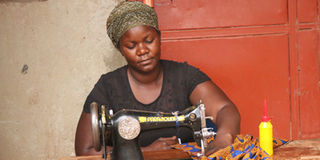Vocational skills have no age limit

Hadijah Kadondi at her verandor where she sews clothes. She enrolled on a Fashion and Design course at Management Training and Advisory Centre in Kampala where she acquired the skills bringing to an end her life as a fruits vendor. Photo by Desire Mbabaali
What you need to know:
- It is never late to acquire a vocational skill. Women vendors who enrolled at Management Training and Advisory Centre are testimony to that.
Teddy Nakiwala has seen it all - sunshine, rain and loss. Sitting under the scorching sun outside Mukwano Arcade in downtown Kampala, with a basket full of oranges, she is obviously tensed up and you can tell she does not want this interview to go on for long.
Quickly stealing a glance to scan the area for any Kampala Capital City Authority (KCCA) law enforcers, she hurriedly says, “I have to be on the lookout, so do not get surprised if I suddenly grab my basket and run away. I would have seen KCCA officers.”
“I do not like this – (pointing at the basket) but I have to find a way of earning a living. It is a risky business considering that vending is illegal. Everyday, I work in the fear that my merchandise, which is also my capital will be taken by the law enforcers. That is no life to live, but I have no option,” Nakiwala explains, wrapping up the conversation unceremoniously.
But this is not only unique to her. Being a street vendor is one of the hardest jobs, given the working conditions. However, vocational skills training is offering an option to this as Hadijah Kadondi, a former vendor and resident of Kito, Bweyogerere attests.
“We were on the street, with my fellow female vendors. I used to hawk yellow bananas and tomatoes, at Mapeera House, Kampala Road. last year, however, Amelia Kyambadde, the Member of Parliament for Mawokota North, came and interested us in available vocational training opportunities. The opportunity was for us to study a vocational skill of our choice free of charge at the Management Training and Advisory Centre (MTAC), Nakawa,” she says.
Jumping at the opportunity, she decided to enrol for a tailoring and fashion design course.
“I realised that I could learn how to sow clothes and be able to sustain my family and I. I would work on the streets during day, and go for training in the evening. All I was required to do was buy materials and transport myself to school, which I did,” Kadondi shares.
Six months down the road, she had the skills to start her own tailoring business.
“I am now off the street. From the little money I used to save from vending, I bought a sewing machine which I put on the veranda of my rental and work on people’s clothes,” she says adding, “My idea was to have a small kiosk by the roadside where I can put my sewing machine, buy materials and tailor clothes while I put my products on display, but I have so far not been able to do that because capital.”
Though Kadondi earns only a few pennies from customers who bring her clothes to mend and tailor, she is grateful she acquired a skill. “I cannot go back to the street now. Having a skill I can put to use makes me a different person because I learned something I previously did not know,” she says
Making money
Additionally, Sarah Kirabo is another of the women vendors who have benefited from the skills programme. “I also enrolled with other vendors and studied bakery and cookery. After completing this course, I knew I had to quit vending. I decided to become a tea girl,” Kirabo shares.
At her home in Makindye, Kirabo makes chapattis and mandazi early in the morning. She then packs them and sells them in the basement of Kira house in the city centre. “When I reach here, I prepare tea, milk and porridge which are taken by people who have offices around here,” she explains.
After their courses, some of the women vendors who were previously doing various vending activities but living in the same neighbourhood in Masajja Delico decided to form a SACCO.
“We used to vend together so, after we finished the training, we joined forces to practice what we had learnt and made a group called Virtuous women,” Juliet Migadde, the chairperson of the seven-group members, says.
Lacking capital
“I had been a hawker for a long time selling secondhand clothes and I would get some money. After the course, I wanted to do something better with myself. I knew that these skills would assist me financially. Though other women have side businesses; for example one has a drug store, another a hair salon, we come together on specific days and make snacks such as cakes, daddies and doughnuts, among others which we sell in shops, supermarkets and for school going children,” she says.
Though some former vendors have been able to create new ways of earning money, some have turned back to the streets because they lack startup capital in their vocations.
Approximately 200 vendors were enrolled. Of these, 130 completed the course and graduated in October last year.
Voices
The challenges have been that most of these women are bread winners, so taking a course for about five months without earning was a bit challenging so the dropout rate is seemingly high. This particular course is a skills enhancement course so at the end, the students get a certificate that qualifies them to work, and improves their skills competencies.
Soteri Nabeeta, executive director management training and advisory centre


